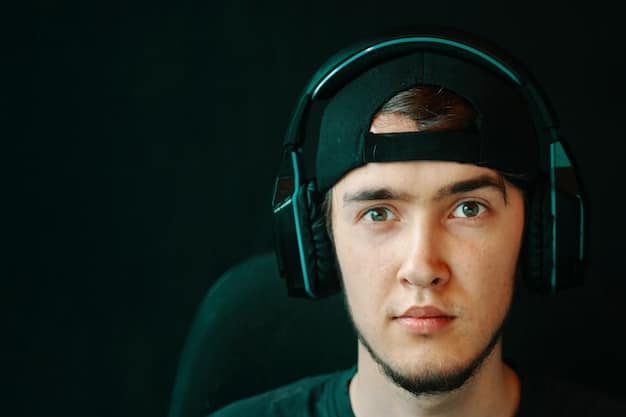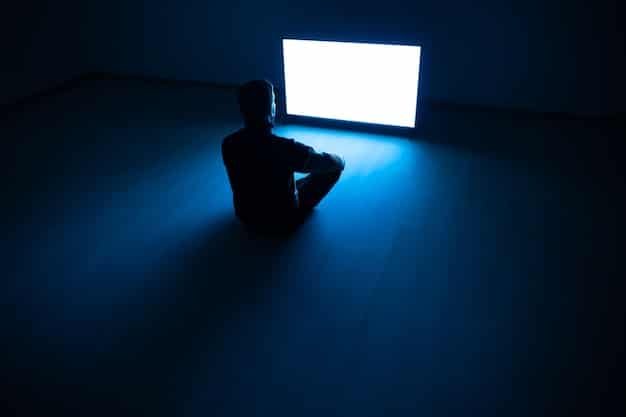Esports and Mental Health: Resources and Support for US Players

Navigating the intense landscape of competitive gaming requires robust mental health support, as US players face unique pressures. Addressing this need is crucial for fostering healthier, more sustainable esports careers and ensuring overall well-being within the gaming community.
The world of esports is booming, captivating millions with its fast-paced action and fierce competition. However, beneath the glitz of professional gaming lies a demanding environment where mental fortitude is as crucial as mechanical skill. For players in the United States, understanding the intersection of Esports and Mental Health: Resources and Support for US Players isn’t just beneficial—it’s essential for sustained success and overall well-being in a rapidly evolving industry.
The Unseen Pressures of Professional Esports
Professional esports demands an unparalleled level of dedication, often blurring the lines between work and leisure. Players spend countless hours honing their craft, which can lead to social isolation and a sedentary lifestyle. The competitive nature itself fosters high-stress environments, where every match, every play, can define a career. For many, the joy of gaming can quickly transform into a relentless pursuit, fraught with anxieties.
The constant pressure to perform, maintain peak physical and mental condition, and navigate public scrutiny contributes significantly to mental health challenges. This environment is unique, and its specific stressors require equally specialized support systems. Without adequate attention to mental health, players risk burnout, diminished performance, and long-term psychological impacts.
Intense Training Regimens and Their Impact
Esports professionals often adhere to grueling training schedules, sometimes extending beyond 10-12 hours a day. This includes scrims, VOD reviews, strategy sessions, and individual practice. Such a demanding routine leaves little room for outside activities, personal relationships, or even adequate rest. The human mind and body are not designed for such sustained, high-intensity focus without proper balance.
- Physical Health Decline: Sedentary lifestyles, poor posture, and irregular sleep patterns can impact overall physical health, which in turn affects mental well-being.
- Social Isolation: Spending most waking hours in front of a screen, even with teammates, can restrict meaningful in-person social interactions.
- Burnout Risk: The constant cycle of learn, practice, compete, and repeat can lead to severe mental and physical exhaustion, often termed “burnout.”
The demands placed on esports athletes are comparable to, and in some ways exceed, those in traditional sports. However, the infrastructure for mental health support in esports is still catching up, particularly in the US. Organizations are slowly realizing that investing in player well-being is not altruism, but a vital component of competitive success and longevity.
Public Scrutiny and Online Toxicity
The digital nature of esports means players are constantly in the public eye, often exposed to unfiltered criticism and online toxicity. Social media, live streams, and public forums provide platforms for fans and detractors alike to voice opinions, sometimes in highly aggressive or personal ways. This relentless scrutiny can profoundly affect a player’s self-esteem and mental state.
Navigating this digital landscape requires immense resilience. Players must develop thick skins, yet remain emotionally available enough to perform at their best. The psychological toll of unwarranted hate, rumors, or even lighthearted but constant teasing can be significant. It’s a unique aspect of esports that rarely features in traditional sports, where direct, anonymous interaction with fans is limited.
Recognizing the distinct pressures of intense training and public scrutiny is the first step toward building effective support systems. As the industry matures, the focus on player welfare will undoubtedly become a cornerstone of sustainable growth.
Common Mental Health Challenges Faced by US Esports Players
While the allure of competitive gaming is undeniable, the environment can exacerbate or even trigger a range of mental health conditions. Understanding these specific challenges is crucial for developing targeted interventions and support mechanisms. In the US, where the esports scene is highly developed and competitive, players often face unique pressures.
The high-stakes nature of professional play, coupled with a lack of robust support infrastructure in certain organizations, can leave players vulnerable. Identifying these issues early and providing accessible resources is key to mitigating their impact and fostering a healthier, more sustainable career path for athletes.
Anxiety and Performance Pressure
Anxiety is arguably one of the most prevalent mental health issues in esports. The constant pressure to perform well, the fear of making mistakes, and the high visibility of competitions can trigger significant anxiety. This performance anxiety can manifest as physical symptoms like increased heart rate, sweating, and tremors, directly impacting a player’s ability to execute complex maneuvers or make critical decisions under pressure.
The “do-or-die” mentality often perpetuated in competitive environments only intensifies this. Players might internalize losses fiercely, leading to self-doubt and heightened anxiety about future matches. This cycle can become debilitating, driving players away from the very activity they once loved.
Depression and Burnout

The intense schedule, social isolation, and constant pressure often culminate in burnout. Burnout is a state of physical or emotional exhaustion that also involves a sense of reduced accomplishment and loss of personal identity. For esports players, this can lead to a significant decline in motivation, impaired performance, and ultimately, a premature end to their careers.
Depression, a more severe and persistent mental health condition, can also arise from or be exacerbated by these factors. Symptoms include persistent sadness, loss of interest in activities, changes in appetite or sleep, and feelings of worthlessness. The fine line between dedicated passion and dangerous obsession can often be crossed, leading players down a path where gaming consumes their entire life, contributing to depressive states if not managed effectively.
- Loss of Enjoyment: What once brought joy becomes a job, devoid of pleasure.
- Apathy: A general lack of interest or enthusiasm towards gaming and other aspects of life.
- Irritability: Increased frustration and short temper, especially during gameplay or interactions with teammates.
- Cognitive Decline: Difficulty concentrating, making decisions, or remembering things—all critical for high-level play.
Addressing depression and burnout requires a multi-faceted approach, including psychological support, scheduled breaks, and a healthy work-life balance. Proactive measures are always more effective than reactive ones when it comes to mental well-being in such demanding fields.
Sleep Disorders and Lifestyle Imbalances
The nature of online gaming often involves irregular schedules, particularly for international competitions that may require playing during unusual hours. This, combined with high screen time and late-night practice sessions, frequently leads to disrupted sleep patterns and chronic sleep deprivation. Sleep is fundamental for cognitive function, emotional regulation, and physical recovery.
Chronic sleep disorders can significantly impair a player’s reaction time, decision-making abilities, and mood. These issues are often compounded by poor dietary habits, lack of physical activity, and insufficient exposure to natural light, creating a cycle that negatively impacts both physical and mental health. A balanced lifestyle, therefore, is not merely a recommendation but a necessity for players to thrive long-term.
Recognizing and addressing these prevalent mental health challenges is a critical step towards fostering a supportive and sustainable environment for US esports players. Proactive strategies and accessible resources are vital in mitigating the risks and promoting overall well-being within the competitive gaming community.
Key Resources and Support Systems in the US
For US esports players navigating the intricate landscape of competitive gaming and mental health, a growing number of resources and support systems are emerging. These initiatives range from specialized mental health services to player associations and team-based programs, all working towards fostering a healthier environment for athletes. The availability and accessibility of these resources are paramount.
The industry is slowly but surely recognizing the importance of holistic player development, where mental well-being is given as much priority as in-game performance. By leveraging these diverse support systems, players can find the help they need to manage stress, anxiety, and other challenges, ensuring a more sustainable and fulfilling career.
Specialized Mental Health Professionals and Organizations
A significant development in esports has been the rise of mental health professionals who specialize in working with gamers. These individuals often have a deeper understanding of the unique pressures and psychological aspects of competitive play. Therapists, sports psychologists, and counselors with experience in esports can provide tailored support that traditional mental health services might not offer.
Several organizations are also dedicated to this cause. For instance, the Active Minds initiative, while broader, has resources applicable to student athletes, including those in collegiate esports. Other specialized groups are forming, aiming to create a network of support for players at all levels. These professionals can help with performance anxiety, stress management, burnout prevention, and general mental well-being.
- Performance Psychologists: Help players manage pre-game jitters, focus during intense moments, and recover from losses.
- Licensed Therapists: Provide counseling for more general mental health concerns like depression, anxiety disorders, and relationship issues, often exacerbated by the esports lifestyle.
- Online Platforms: Some platforms now offer discreet, online therapy specifically for gamers, addressing the unique scheduling and privacy needs of esports athletes.
Access to these specialized resources is critical, particularly for professionals who spend significant time traveling or in team houses. Remote therapy options can bridge geographical gaps and ensure continuity of care, which is vital in a dynamic environment.
Team and Organizational Support
Increasingly, professional esports organizations are investing in internal support structures for their players. This includes employing mental performance coaches, team therapists, or establishing partnerships with mental health providers. These in-house resources can offer immediate and consistent support, integrated directly into the team’s daily operations.
Beyond direct therapy, organizational support often extends to building a positive team culture, promoting healthy routines, and mandating regular breaks. Some teams provide dedicated “wellness days” or encourage physical activity, recognizing its symbiotic relationship with mental health. Top-tier organizations understand that a healthy player is a high-performing player, viewing mental health support as an investment rather than an expense.
However, the quality and availability of these internal resources can vary widely between organizations. Players considering joining a team should inquire about the mental health support available, as it reflects the organization’s commitment to their well-being beyond pure performance metrics. A strong support system can make a significant difference in a player’s ability to cope with the rigorous demands of competitive play.
Player Associations and Community Initiatives
The burgeoning landscape of US esports has also seen the rise of player associations and community-led initiatives focused on athlete welfare. Organizations like the North America Scholastic Esports Federation (NASEF) for scholastic players, or nascent professional player unions, are beginning to advocate for better working conditions, including mental health provisions.

These associations can serve as collective bargaining units, pushing for industry-wide standards regarding player contracts, schedules, and access to healthcare, including mental health services. Community initiatives, often grassroots efforts, provide peer support, share coping strategies, and raise awareness about mental health issues within discreet gaming communities. Such initiatives are particularly valuable for semi-professional or amateur players who may not have access to formal organizational support.
The collective strength of player associations and community groups is vital in advocating for mental health awareness and policy changes within the esports ecosystem. These platforms allow players to share experiences, reduce stigma, and champion for a healthier, more equitable future in competitive gaming.
The availability of these diverse resources signals a positive shift in how the esports industry approaches player welfare. By proactively engaging with these support systems, US players can build greater resilience and navigate the challenges of professional gaming with improved mental fortitude and sustained well-being.
Strategies for Maintaining Mental Well-being in Esports
Beyond accessing external resources, US esports players can proactively adopt various strategies to safeguard their mental well-being. These self-help approaches, combined with professional support, form a comprehensive shield against the unique pressures of the competitive gaming world. Proactive engagement with personal care and healthy habits is fundamental for sustained performance and personal happiness.
From establishing daily routines to fostering a strong support network, these strategies empower players to take ownership of their mental health journey. A balanced approach that integrates intense practice with periods of rest and recovery is crucial for preventing burnout and promoting long-term resilience.
Establishing Healthy Routines and Boundaries
One of the most effective ways for esports players to maintain mental health is by establishing clear boundaries between their gaming life and personal life. This means setting consistent practice schedules, taking regular breaks, and ensuring dedicated time away from the screen. A well-structured routine can provide predictability and reduce the feeling of being constantly “on” or overwhelmed.
This also includes adhering to a consistent sleep schedule, even when competitive play or travel might tempt disruption. Prioritizing physical activity, even light exercises, and maintaining a balanced diet are non-negotiable for overall well-being. These foundational habits create a stable base from which players can manage the intense demands of their careers without compromising their mental state.
- Scheduled Breaks: Step away from the screen every hour or two for short walks or stretches.
- Dedicated Downtime: Designate specific hours or days for non-gaming activities and social interactions.
- Consistent Sleep: Aim for 7-9 hours of quality sleep, even if it means adjusting practice times.
Healthy routines are preventative measures; they build mental resilience and reduce the cumulative stress that can lead to burnout. Players who master the art of setting boundaries often demonstrate greater longevity and consistent performance in their careers.
Cultivating a Positive Support Network
No player should have to navigate the pressures of esports alone. Cultivating a strong support network is paramount. This network can include family, friends outside of gaming, trusted teammates, coaches, and mental health professionals. Having people to talk to, share concerns with, and receive encouragement from can significantly alleviate feelings of isolation and stress.
It’s important to differentiate between professional relationships within the team dynamic and personal friendships. While team camaraderie is vital, having external connections provides a necessary emotional outlet and perspective that isn’t tied to performance metrics. Open communication within the team and with support figures fosters an environment where mental health is openly discussed and addressed, rather than suppressed.
Building diverse relationships helps players gain emotional distance from the intense competitive environment, reminding them that their value extends beyond their in-game performance. A supportive circle can be a lifeline during challenging times, offering genuine comfort and valuable advice.
Mindfulness, Relaxation, and Self-Care Practices
Beyond external support, developing internal coping mechanisms is vital. Practices like mindfulness, meditation, and deep breathing exercises can help players manage stress, improve focus, and regulate emotions. Even a few minutes a day dedicated to these practices can make a significant difference in a player’s ability to stay calm under pressure and maintain mental clarity.
Self-care isn’t just about relaxation; it’s about actively engaging in activities that recharge you. This could be pursuing hobbies outside of gaming, reading a book, listening to music, or spending time in nature. The key is to find activities that genuinely bring joy and provide a mental break from the demands of competition. Regularly engaging in these activities helps prevent mental fatigue and maintains a healthy overall perspective.
Integrating mindfulness and self-care into daily life transforms them from occasional activities into essential components of a player’s training regimen. Just as physical training improves athletic performance, these mental practices enhance resilience and cognitive function, crucial for high-level esports play. Prioritizing self-care is not a sign of weakness, but a hallmark of a truly dedicated and intelligent athlete.
Role of Organizations and the Community in Fostering Well-being
While individual players have a role in their mental well-being, the larger esports ecosystem—teams, event organizers, game publishers, and the community—bears a significant responsibility in fostering a supportive environment. Their collective actions can either exacerbate existing pressures or create pathways for comprehensive mental health support. Recognizing this shared responsibility is crucial for the sustainable growth and integrity of the industry.
A proactive approach from these stakeholders can lead to systemic changes that prioritize player health, ultimately benefiting the longevity of careers and the overall image of esports. It’s an investment in human capital that yields returns far beyond competitive results.
Creating Supportive Team Environments
Esports organizations play a pivotal role in shaping the daily lives of their players. Creating a genuinely supportive team environment involves more than just providing a coach and a gaming house. It means fostering open communication, promoting psychological safety, and ensuring that players feel valued beyond their in-game performance. This includes:
- Transparent Communication: Openly addressing issues, concerns, and expectations to build trust.
- Empathy and Understanding: Recognizing that players are individuals with unique needs and challenges, not just assets.
- Access to Resources: Proactively connecting players with mental health professionals and support services.
- Work-Life Balance: Implementing policies that prevent overwork and encourage necessary breaks and time off.
A positive team culture acts as a buffer against external pressures, providing a safe space where players can candidly express their struggles without fear of judgment or repercussions. Teams that prioritize well-being not only retain talent longer but also often see improved performance due to heightened morale and focus.
Industry-Wide Standards and Best Practices
For mental health support to be consistently effective across the US esports landscape, industry-wide standards and best practices are essential. This could involve major esports leagues, publishers, and player associations collaborating to establish guidelines for player welfare, including:
Mandating access to mental health professionals within professional contracts. Implementing maximum daily practice hours and mandatory off-season breaks. Developing standardized screening tools to identify early signs of distress. Creating educational programs for coaches, managers, and players on mental health awareness.
Such standards would ensure a baseline level of care, preventing smaller or newer organizations from neglecting player well-being. It would also legitimize mental health as a core component of professional esports, akin to physical training or strategic coaching. Harmonized efforts can elevate the entire industry, making it a more appealing and healthier career path.
Community Role in Reducing Stigma and Promoting Awareness
The broader esports community, including fans, content creators, and media, also has a crucial role to play. By actively challenging online toxicity, promoting respectful discourse, and amplifying positive messages about mental health, the community can significantly reduce the stigma associated with seeking help.
Content creators can use their platforms to share personal stories, advocate for mental health resources, and encourage empathy among their followers. Media outlets can responsibly cover mental health stories, focusing on solutions and support rather than sensationalism. When the community embraces a culture of care and understanding, it empowers players to speak up without fear of being seen as “weak” or “unprofessional.” This collective effort transforms the digital ecosystem into a more supportive and humane space for all involved.
The collaborative efforts of organizations and the community are fundamental in building a resilient and healthy esports environment. By prioritizing player well-being, the industry can ensure its long-term success and cultivate a generation of athletes who thrive both in and out of the game.
| Key Point | Brief Description |
|---|---|
| 🎮 Intense Pressures | Esports players face long hours, public scrutiny, and high-stakes performance demands leading to stress. |
| 🧠 Mental Challenges | Common issues include anxiety, performance pressure, burnout, depression, and sleep disorders. |
| 🤝 Support Systems | Resources range from specialized therapists to team-based support and player associations in the US. |
| 🧘 Self-Care Strategies | Establishing routines, building support networks, and practicing mindfulness are key for well-being. |
Frequently Asked Questions About Esports and Mental Health
▼
The intense competitive environment, long hours, social isolation, and constant public scrutiny place significant pressure on players. These factors can lead to increased rates of anxiety, burnout, and depression, making mental health a critical concern for the industry’s sustainability.
▼
Common issues include performance anxiety, general anxiety, burnout, and depression due to demanding schedules and high-stakes competition. Sleep disorders and lifestyle imbalances are also prevalent, negatively impacting overall well-being and performance.
▼
Players can access specialized mental health professionals, team-supported psychologists, and player associations. Community initiatives and online platforms dedicated to gamer well-being also offer valuable support and resources tailored to specific needs.
▼
Proactive strategies include establishing healthy routines, setting boundaries between work and life, cultivating a strong support network of friends and family, and practicing mindfulness or other self-care activities to manage stress and prevent burnout.
▼
Organizations should foster supportive team environments, provide access to mental health resources, and implement healthy practices. The community at large can reduce stigma, promote awareness, and challenge online toxicity, creating a more positive and protective ecosystem for players.
Conclusion
The burgeoning world of esports, with its immense competitive pressures and unique demands, necessitates a robust focus on player mental health. For US players, understanding these challenges and accessing appropriate resources is no longer a luxury but a crucial component of a sustainable and healthy career. From specialized professional support and organizational initiatives to individual strategies and community advocacy, a holistic approach is vital. By prioritizing mental well-being, the esports industry can foster an environment where athletes not only achieve peak performance but also thrive as individuals, ensuring a healthier and more resilient future for competitive gaming.



![Mastering [your chosen topic] in PC Gaming: A Deep Dive Mastering [your chosen topic] in PC Gaming: A Deep Dive - Cover Image](https://arcanenews.com/wp-content/uploads/2025/07/arcanenews.com_11_1753889991_8be9b385_cover-360x180.jpg)

